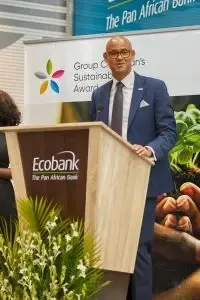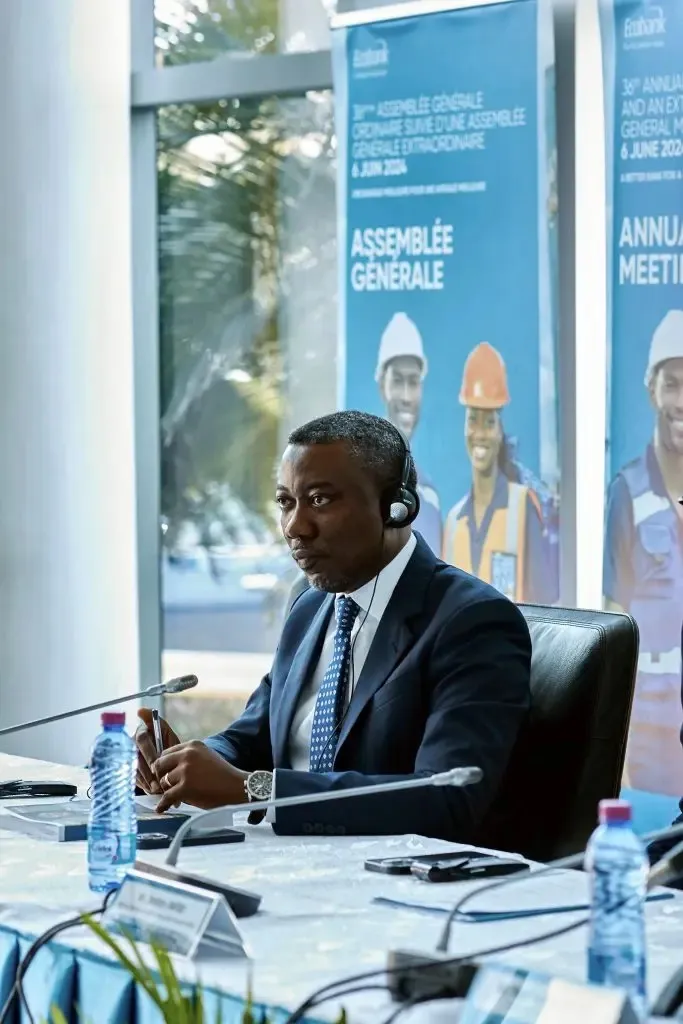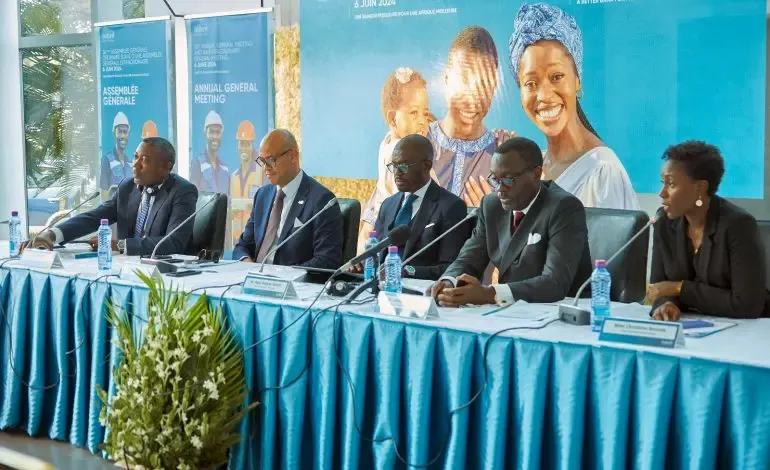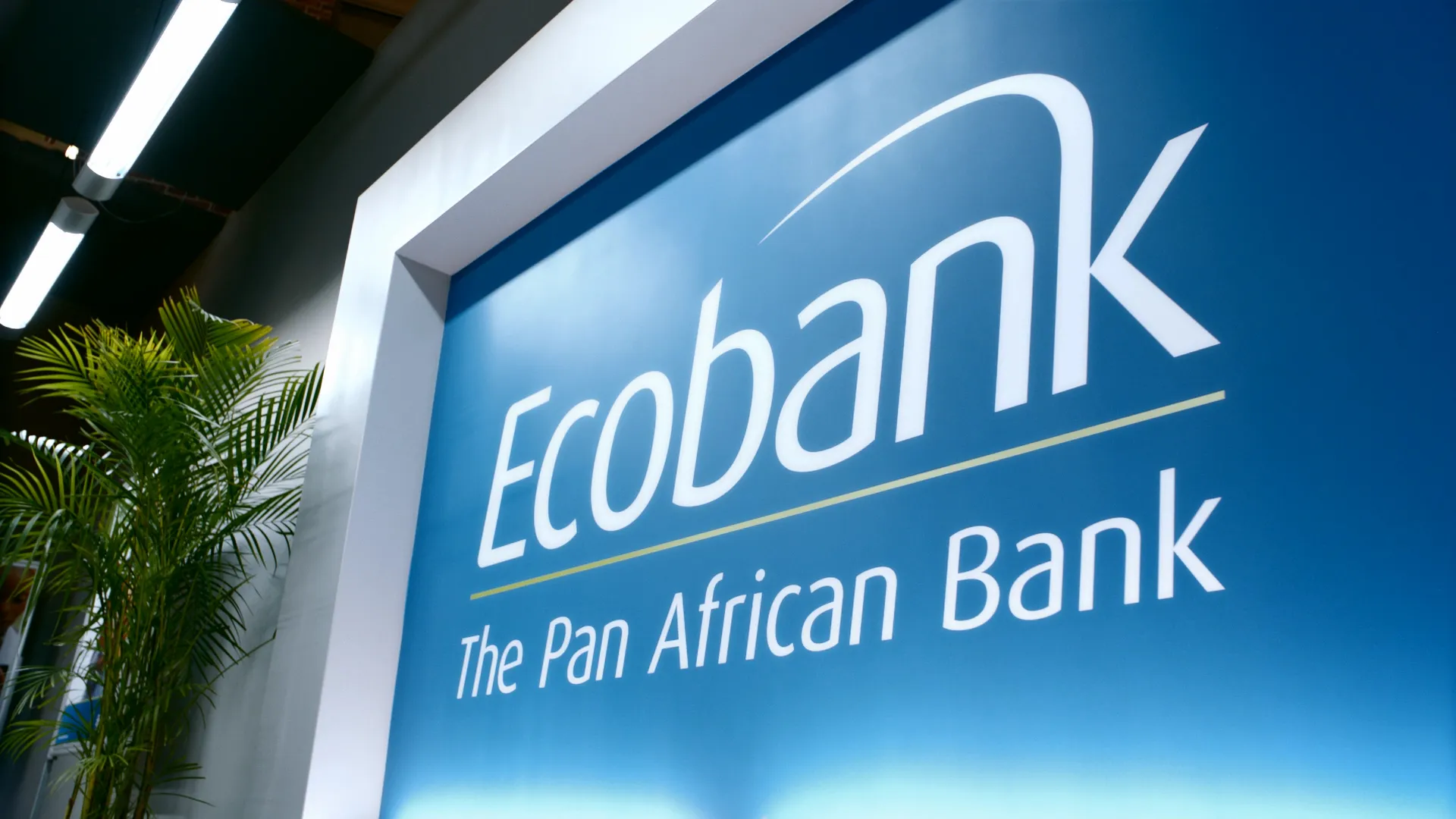This article was produced with the support of Ecobank
‘A better bank for a better Africa’. This is the title of the cover of Ecobank’s Annual Report. This slogan perfectly defines the bank’s mission as it approaches its 40th anniversary in 2025. Ecobank has a rich history. Founded by Africans, run by Africans, for Africans, this exemplary bank is a great success story.
What makes Ecobank unique in Africa is the cosmopolitan composition of its fifteen-member Board of Directors, its fifteen-member Executive Committee and its 15,000 employees.
A heartfelt tribute is due here to the illustrious Gervais Koffi Djondo, and to the late Adeyemi Lawson, the two real Fathers of Ecobank. Without them and their Chambers of Commerce of Togo and Nigeria, there would never have been the sacred union between Africans from several French and English speaking West African countries. This union led to the creation of a Pan-African bank in 1985 to meet the urgent financial needs of the region’s entrepreneurs. Djondo’s monumental feat was repeated with the creation of Asky, the prestigious African airline of which he was also the founder.
Citibank helped launch Ecobank and Ethiopian Airlines helped launch Asky. The decision to bring in recognised experts to run these two businesses have been vital in ensuring their success. Ecobank Togo was the first to open in 1988.

The leader who made Ecobank what it is today is the brilliant Pan-African banker Arnold Ekpe. He was twice called upon to take over the reins of the bank. As the CEO, he did a great job. He hired a young team of talented Africans including many women, gave them their chance and together, they built what is Ecobank today. At the tender age of 60, he respected the age limit set by the Articles of Association – he could have had them changed – without having completed the ‘Work in Progress’, his favourite phrase. This entrepreneur at heart fulfilled the dream of the Founding Fathers. When he left, the bank was present in 35 countries in what he called ‘Middle Africa’, i.e. the entire continent outside North Africa and South Africa. The bank was also present in London, Paris, Dubai and Beijing.
Arnold Ekpe’s goal was to be among the top three banks in each country. His admirable record and formidable achievements – including the bank’s new headquarters, one of Lomé’s most beautiful and best-known monuments – will forever mark the career of this admirable Nigerian.
A Setback
The mission of his successors was to consolidate what had been achieved and ensure the rapid growth of what had become one of the rare Pan-African success stories, an example for all. The new management had to pursue all the strategic objectives set and become a behemoth that could not be ignored. Banks in Morocco, Nigeria and elsewhere were on the lookout. Seeing the ease with which Ecobank was developing everywhere, they quickly followed suit and established themselves in these increasingly competitive markets.
A poor choice of CEO brought Ecobank’s development to a screeching halt, proving that the legendary Arnold Ekpe was still an indispensable man. It took the new management a long decade to put things right and get the institution back on track. Unfortunately, growth has been mediocre and the African shareholders – the backbone of the bank – are not happy. These small investors who have unshakeable faith in Ecobank have not been rewarded. They bitterly regret that they have not reaped the expected rewards, either through the appreciation of their shares or through dividends. This is indisputable proof that the success of any company depends solely on the quality of its management: building a company is a thousand times more difficult than destroying it.
A poor choice of CEO brought Ecobank’s development to a screeching halt, proving that the legendary Arnold Ekpe was still an indispensable man. It took the new management a long decade to put things right and get the institution back on track. Unfortunately, growth has been mediocre and the African shareholders – the backbone of the bank – are not happy. These small investors who have unshakeable faith in Ecobank have not been rewarded. They bitterly regret that they have not reaped the expected rewards, either through the appreciation of their shares or through dividends. This is indisputable proof that the success of any company depends solely on the quality of its management: building a company is a thousand times more difficult than destroying it.

Now, back to the burning question of the day. Has Ecobank become a better bank in a better Africa? The answer is unquestionably yes. There is no longer any doubt about it. This was demonstrated at the ordinary and extraordinary general meetings held in Lomé on Thursday 7 June. In living memory, these meetings were the shortest and the best ever organised. Gone were the folkloric speeches of yesteryear; there were virtually no shareholder complaints and a notable absence of the usual active and noisy association representatives. The presence of royalty in the audience was noteworthy, as was the customary elegance of the amazing African dresses adorned by beautiful women. It should also be noted that all the resolutions were adopted at 100% or by more than 99.96% of the votes cast, with the exception of one which was adopted by 95%, which is a remarkable score. Finally, this year’s highlight was the unanimous tribute paid to management by various shareholders.
This feat was repeated at the Extraordinary General Meeting, where the resolution authorising the raising of $600 million was approved by 99.97% of the votes. These funds will be used to repay a debt of 500 million dollars that is due to mature.
Impressive results
The bank’s turnaround is now complete. It is back on track again, in the hands of excellent management. The results speak for themselves and the figures are flattering. Before we look at them, let us congratulate Alain Nkontchou, whose last term as Chairman comes after four rewarding years and another five as a director. The Cameroonian Chairman is handing over the reins to Papa Ndiaye from Senegal, who has had exactly the same glorious career in the world of African and international finance. We should also congratulate Jeremy Awori, who has just completed his first full year at the head of the bank. The Kenyan CEO has proved to be an excellent choice and the right man for the future.

The bank made a consolidated profit of $581 million, up 8% from 2022, despite significant provisions and the sharp devaluations of African currencies. Revenues exceeded the historic 2 billion dollar mark, up 6%. This performance is the highest ever achieved by the Ecobank Group. Total assets exceeded $27 billion. In order to be able to maintain the regulatory ratios required, increase the capital and invest to strengthen Ecobank’s development, it has been decided not to distribute dividends this year, much to the regret of the shareholders big and small.
The management team has been considerably strengthened with the arrival of four new executive directors. An ambitious Growth, Transformation and Profitability strategy has been developed to accelerate revenue and profit growth and pay regular dividends.
Ecobank is now among the TOP 5 in 22 countries, TOP 3 in 15 countries and TOP 1 in eight countries. We are still a long way from the goal of being in the TOP 3 in 35 African countries! To be truly successful, the bank needs to expand in Nigeria, Africa’s largest country, and exploit the immense potential of a continent where banking is still a rarity. It also needs to develop its IT considerably, a sector where, in the past, it has been a pioneer. It has been able to extend its network to 33 African countries and provide financial connectivity to more than 61% of the continent. Another sector for growth which has been untapped until now is the insurance market.
Ecobank’s main asset and great strength is its diversified presence in 35 countries on a continent that will dominate tomorrow’s world thanks to the dynamism of its youth and the prodigious size of its population. The future lies in Africa, more than anywhere else in the world. Ecobank’s declared ambition is that 40% of the bank’s staff at all levels should be women, instead of the current 30%. Ecobank is also committed to sustainable development and to celebrating positive environmental and social change.
The strength of a Pan-African group
What makes Ecobank unique in Africa is the cosmopolitan composition of its fifteen-member Board of Directors, its fifteen-member Executive Committee and its 15,000 employees. It is the representatives of 43 different nationalities who make up the great strength of this venerable institution. The bank has a network of 650 branches, over 2,400 ATMs, more than 32 million customers and almost 14 million mobile app users. It is listed on the Accra, Abidjan and Lagos stock exchanges.
This leading Pan-African banking group still has its work cut out for it. It needs to continue its expansion at all costs in “Middle Africa” where it is not yet present, such as Angola, Ethiopia and Sudan. Now that profitability is assured, it also needs to considerably increase its communications budget if it is to become one of the ten best-known brands in Africa.
Finally, there is the fundamental problem of shareholding. We need to get back to the DNA of the bank, which is to have African shareholders to serve the interests of Africans. It may be an irritating subject, but the vast majority of shares must absolutely be in African hands.Having said that, I would like to thank the loyal major shareholders Nedbank, QNB, PIC and Arise BV for their firm support of the bank.
To conclude, may I express the wish that the directors be fervent Ecobankers, totally devoted to the mission of the Bank as intended by the Founding Fathers?

To learn more about Ecobank, we recommend reading the excellent book “The History of Ecobank” written by the late Kaye Whiteman. He is one of the best British journalists specialising on the continent, along with his mentor the titan David Williams. Both were indomitable editors of the famous weekly magazine West Africa. They devoted their lives to serving Africa’s interests. No one knew the region better than they did. They were admired and respected by the region’s leaders, who placed their full trust in them and enjoyed a privileged relationship with them. The third name is our good friend and colleague Patrick Smith, editor of Africa Report and the 35-year-old Africa Confidential newsletter.
Anyone interested in learning more about the legendary Arnold Ekpe should read his book “The Bush Banker”, one of Africa’s best business books ever.

 Sign in with Google
Sign in with Google 


